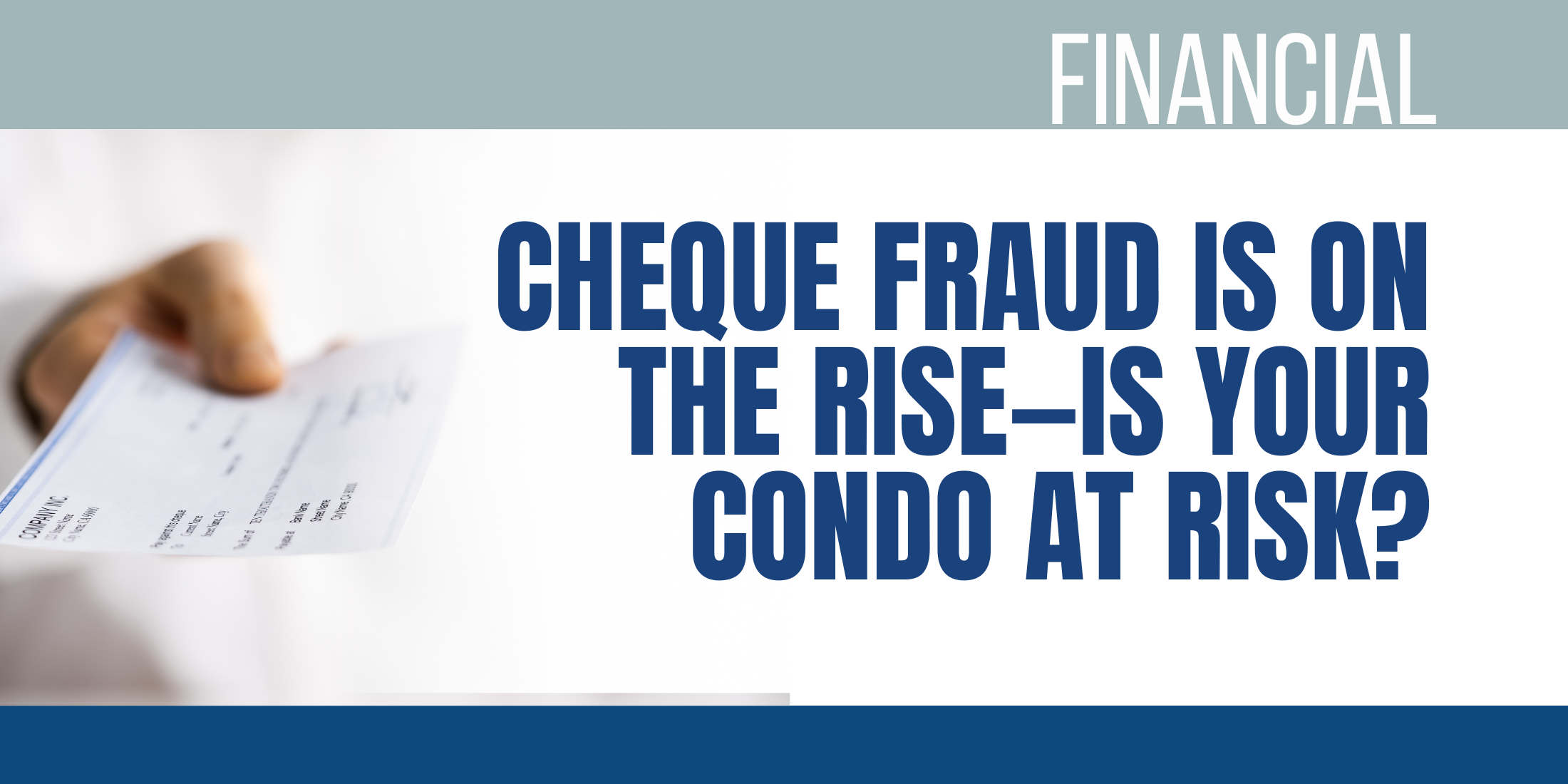Written by: Corey Krakower
Corey Krakower is a payments expert with over a decade of experience with financial technology providers and one of Canada’s largest accounting firms. He is currently serving as the Director of Business Development for SparcPay, a leading secure digital payments provider to the condominium industry.
Outdated payment processes expose condo corporations to fraud, financial losses, and legal risks, making it crucial to understand how fraud occurs and implement key protective strategies.
Cheque fraud is on the rise, costing organizations millions of dollars each year. Unfortunately, condominium corporations are not immune.
Their reliance on cheques for vendor payments and other transactions makes them especially vulnerable. The consequences of cheque fraud are far-reaching, encompassing financial losses, reputational harm, and the potential erosion of trust among board members and residents. However, with the right strategies and tools, these risks can be mitigated.
The Current State of Cheque Fraud
According to a 2023 report by the Association for Financial Professionals, cheque fraud remains one of the most prevalent types of payment fraud, accounting for nearly 66% of reported incidents. The relatively simple nature of cheque manipulation, combined with outdated practices, makes it an attractive target for fraudsters.
Despite the risks being publicized for years, condo
corporations often issue a significant number of cheques to contractors, service providers, and utility companies. While this may seem straightforward, the inherent vulnerabilities of cheques make them a risky choice. Fraudsters can alter the payee’s name, modify amounts, or even counterfeit cheques outright. These attacks are often sophisticated, leveraging stolen chequebooks or exploiting relaxed oversight during the approval process.
Unfortunately, many directors believe that cheques are protected by their bank or that the presence of a signature ensures there is no unauthorized release of the condo’s funds. In most cases, this is simply not true, and the banks do not provide protection against cheque fraud. This is demonstrated by a business that experienced repeated cheque fraud incidents that the bank could not stop. The result was over half a million dollars in losses, failure of the business and a lawsuit against the bank. In another case, a condo in BC experienced $50,000 in cheque fraud, and their bank admitted they “do not look at names or signatures on cheques”.
Real-World Examples of Fraud Tactics
Cheque fraud can occur in various ways, and condo corporations are particularly vulnerable due to their operational structure.
Common tactics include intercepting cheques during mailing and altering the payee or amount to divert funds to unauthorized accounts. In some cases, fraudsters may create counterfeit cheques using stolen account details. Internal fraud is another risk, where individuals with access to cheque books or banking information exploit weak oversight to issue unauthorized payments.
These scenarios highlight the importance of robust controls and vigilant monitoring to detect and prevent fraudulent activity.
Proven Strategies to Protect Your Funds
1. Transition to Digital Payments:
Digital payment solutions significantly reduce the risks associated with cheque fraud. Unlike cheques, digital payments offer greater transparency and are often equipped with built-in fraud prevention features, such as multi-factor authentication and audit trails.
By adopting platforms that specialize in secure automated approvals and electronic payments, condo corporations can eliminate the vulnerabilities of cheques entirely.
Cheque fraud thrives on weak or nonexistent approval processes.
Despite years of warnings, many condo corporations still rely on cheques—making them easy targets for fraudsters.
2. Implement Approval Workflows:
Fraud often exploits weak or nonexistent approval processes. Condo corporations should enforce strict dual-approval workflows for all payments, ensuring no single individual has unilateral control over funds. Modern digital payment platforms allow for the seamless integration of approval workflows, enabling transparency and accountability at every step.
3. Conduct Regular Bank Reconciliations:
The timely reconciliation of bank statements can help detect irregularities early. Assigning this responsibility to an independent party, such as a third-party property management firm, ensures an additional layer of oversight and reduces the risk of insider fraud.
4. Educate Board Members and Staff:
Knowledge is a powerful tool in preventing fraud. Regular training sessions on common fraud tactics, warning signs, and best practices can empower board members and staff to act as the first line of defense.
Staying Ahead of Financial Threats
The financial and reputational stakes are too high for condo corporations to ignore the risks associated with cheque fraud. By embracing digital payment technologies, strengthening internal controls, and fostering a culture of vigilance, condo boards can protect their communities from the devastating consequences of fraud.
Transitioning to secure, automated payment systems
can transform the financial operations of organizations. Beyond reducing fraud risk, these tools enhance efficiency, transparency, and trust—qualities that every condo corporation should strive for.
In a world where financial threats continue to evolve, staying ahead requires proactive measures and a commitment to modernization. Safeguarding your condo corporation’s funds isn’t just about preventing losses; it’s about preserving the integrity and trust that strengthen the communities we call home.
References
1. Chesney, S. (2022, July 28). Uptick in fraud a wake-up call for condos. Retrieved from YalePGC: https://www.yalepgc.ca/uptick-in-fraud-a-wake-up-call-for-condos/
2. Association of Financial Professionals. (2024, March 15). 2024 AFP Payments Fraud and Control Survey Report. Retrieved from AFP Online: https://www.afponline.org/training-resources/resources/survey-research-economic-data/details/payments-fraud
3. Hanny, C. (2024, 04 28). Toronto small business forced to close after losing money to cheque fraud that TD couldn’t stop. Retrieved from The Globe and Mail: https://www.theglobeandmail.com/business/article-canada-small-business-cheque-fraud/
4. Tomlinson, K. (2011, 05 03). Banks don’t look at names, signatures on cheques. Retrieved from CBC News: https://www.cbc.ca/news/banks-don-t-look-at-names-signatures-on-cheques-1.978046

